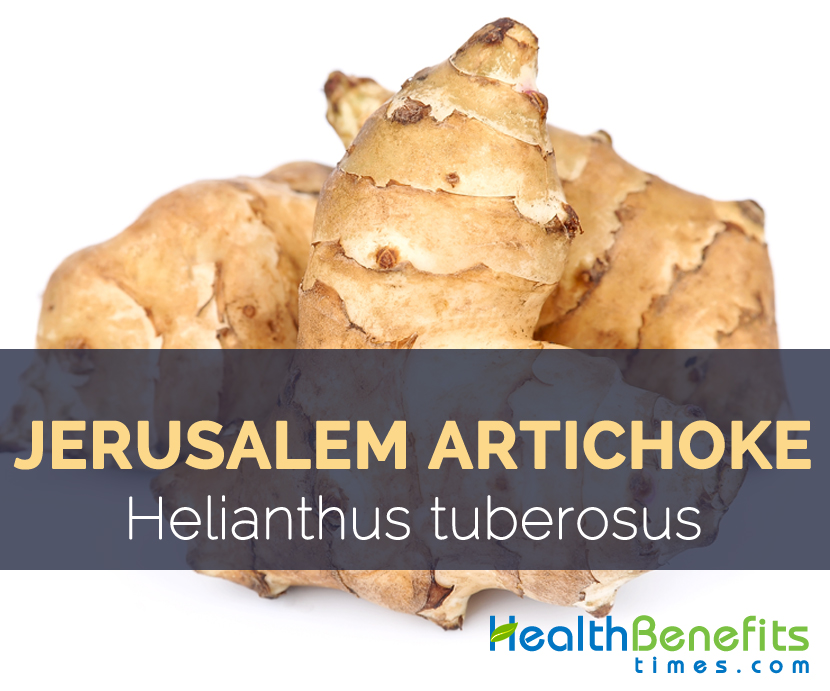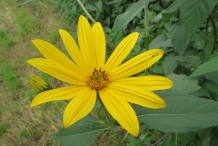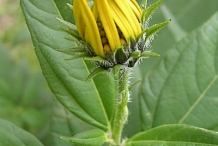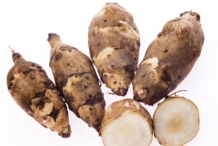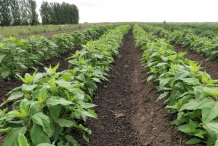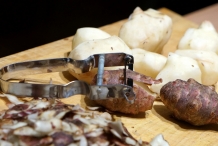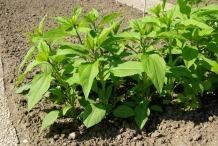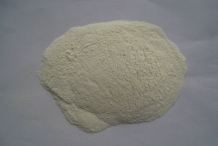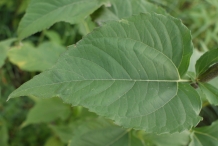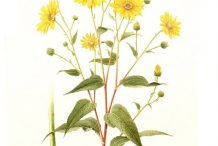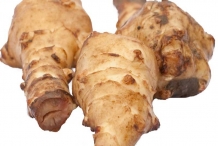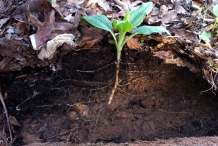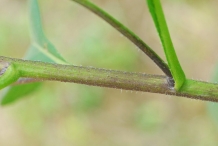| Jerusalem artichokes Quick Facts | ||
|---|---|---|
| Name: | Jerusalem artichokes | |
| Scientific Name: | Helianthus tuberosus | |
| Origin | Eastern United States and Mexico | |
| Colors | Pale brown to white, red and purple | |
| Shapes | Knobby, round clusters, elongated and uneven, ranging in size from 7.5 to 10 cm long, 3–5 cm thick, with nodes, inter nodes and eyes and vaguely resembling ginger root. | |
| Flesh colors | White | |
| Taste | Nutty | |
| Calories | 110 Kcal./cup | |
| Major nutrients | Iron (63.75%) Vitamin B1 (25.00%) Copper (23.33%) Carbohydrate (20.12%) Phosphorus (16.71%) |
|
| Health benefits | Boost the immune system, Control cholesterol, Control blood pressure, Muscle Function, Supports a Healthy Cardiovascular System, Helps Prevent Premature Aging, Helps Maintain Dental Health | |
| More facts about Jerusalem artichokes | ||
| Proximity | Amount | % DV |
|---|---|---|
| Water | 117.02 g | N/D |
| Energy | 110 Kcal | N/D |
| Energy | 456 kJ | N/D |
| Protein | 3 g | 6.00% |
| Total Fat (lipid) | 0.02 g | 0.06% |
| Ash | 3.81 g | N/D |
| Carbohydrate | 26.16 g | 20.12% |
| Total dietary Fiber | 2.4 g | 6.32% |
| Total Sugars | 14.4 g | N/D |
| Minerals | Amount | % DV |
|---|---|---|
| Calcium, Ca | 21 mg | 2.10% |
| Iron, Fe | 5.1 mg | 63.75% |
| Magnesium, Mg | 26 mg | 6.19% |
| Phosphorus, P | 117 mg | 16.71% |
| Potassium, K | 644 mg | 13.70% |
| Sodium, Na | 6 mg | 0.40% |
| Zinc, Zn | 0.18 mg | 1.64% |
| Copper, Cu | 0.21 mg | 23.33% |
| Manganese, Mn | 0.09 mg | 3.91% |
| Selenium, Se | 1 µg | 1.82% |
| Vitamins | Amount | % DV |
|---|---|---|
| Water soluble Vitamins | ||
| Vitamin B1 (Thiamin) | 0.3 mg | 25.00% |
| Vitamin B2 (Riboflavin) | 0.09 mg | 6.92% |
| Vitamin B3 (Niacin) | 1.95 mg | 12.19% |
| Vitamin B5 (Pantothenic acid) | 0.596 mg | 11.92% |
| Vitamin B6 (Pyridoxine) | 0.116 mg | 8.92% |
| Vitamin B9 (Folate) | 20 µg | 5.00% |
| Folic Acid | 0 µg | N/D |
| Folate, food | 20 µg | N/D |
| Folate, DEF | 20 µg | N/D |
| Choline | 45 mg | 8.18% |
| Vitamin C (Ascorbic acid) | 6 mg | 6.67% |
| Fat soluble Vitamins | ||
| Vitamin A, RAE | 2 µg | 0.29% |
| Vitamin A, IU | 30 IU | N/D |
| Beta Carotene | 18 µg | N/D |
| Vitamin E (alpha-tocopherol) | 0.28 mg | 1.87% |
| Vitamin K (phylloquinone) | 0.2 µg | 0.17% |
| Lipids | Amount | % DV |
|---|---|---|
| Fatty acids, total monounsaturated | 0.006 g | N/D |
| Oleic acid 18:1 (octadecenoic acid) | 0.006 g | N/D |
| Fatty acids, total polyunsaturated | 0.002 g | N/D |
| Linoleic acid 18:2 (octadecadienoic acid) | 0.002 g | N/D |
Health benefits of Jerusalem artichoke
Also known as sun choke, sun root and earth apple all over the world, this vegetable Jerusalem artichoke does not really have any association with Jerusalem and has an array of health benefits that many are unaware of Listed are some popular benefits of consuming Jerusalem artichoke:
1. Control cholesterol
Soluble fiber present in Jerusalem artichoke helps to lower blood cholesterol level by lowering low density lipoprotein or bad cholesterol levels. Apart from that fiber is also beneficial for other heart health benefits like reducing inflammation and blood pressure. Raw Jerusalem artichoke consists of 2.4 g of Fiber which is 6.32% of the daily recommended value.
2. Control blood pressure
Jerusalem artichoke consists of considerable amount of potassium and minimal amount of sodium, which is helpful in lowering blood pressure. One cup of raw tuber contains 644 mg of potassium and only 6 milligrams of sodium. Similarly, the fiber content in the Jerusalem artichoke is supportive in improving the performance of insulin in the body, which helps in the lowering of blood pressure.
3. Boost the immune system
Antioxidant vitamins like vitamin A, vitamin C and vitamin E are available in Jerusalem artichoke in minimal amounts. All these vitamins along with flavonoid compounds like carotenes helps seek and remove free radicals, providing the body protection from cancers, viral cough, inflammation and common cold. One cup of raw tuber consists of 2 µg of vitamin A, 6 mg of vitamin C and 0.28 mg of vitamin E.
4. Muscle Function
Iron which is sufficiently found in Jerusalem artichoke is an essential element for better muscle health. Iron is present in the muscle tissue and helps to provide the supply of oxygen which is needed for contraction of muscles. Without sufficient iron muscle will lose its tone and elasticity which leads to muscle weakness and muscle weakness is one of the major indication of anemia.
5. Supports a Healthy Cardiovascular System
Jerusalem artichoke consists of sufficient amount of Thiamine which is essential for producing neurotransmitter called acetylcholine which is used to relay message between nerves and muscle. Our heart is one of the main muscles that rely on these crucial signals. So as to maintain proper cardiac function and healthy heart beat rhythms, the nerves and muscles must be able to use bodily energy to keep signaling to each other.
Recent research has shown that thiamine is helpful in combating heart disease since it maintains healthy ventricular function and to help treat heart failure.
6. Helps Prevent Premature Aging
Copper is a powerful antioxidant which is present in Jerusalem artichoke which works in presence of antioxidant superoxide dismutase to safeguard the cell membranes from free radicals. It is one of the powerful antioxidant which helps to fight against free radicals. Free radicals may attack several organs systems but are particularly studied in terms of their effects on aging like age spots, wrinkles, macular degeneration as well as kidney malfunctions. Therefore sufficient amount of Copper is required for looking younger for longer time. Raw Jerusalem artichoke consists of 0.21 mg of copper which is 23.33% of the daily recommended value.
7. Helps Maintain Dental Health
Jerusalem artichoke consists of huge amount of phosphorus which is bone and teeth health. Phosphorus along with calcium and vitamin D plays an important role in formation and maintenance of dental health by supporting tooth enamel, jaw bone mineral density. Apart from that these vitamins and minerals also help to heal tooth decay.
Basically children need foods that are high in phosphorus and calcium while they are developing adult teeth in order to form teeth’s hard structure. Vitamin D is required along with phosphorus to control the body’s balance of calcium and improve its absorption during tooth formation. Vitamin D can also help to decrease inflammation of gums which is related with periodontal gum disease.
https://www.youtube.com/watch?v=xuwNPdHs430
How to Eat
- It is used as a vegetable that could be baked, mashed, steamed or made into soups, pickles and sauces or eaten raw in salads.
- They are good grated into fresh salads and are a perfect snack for dieters.
- Boiled and mashed, they are somewhat similar to potatoes and can be used like potatoes in most recipes and can be used in a delicious and nourishing soup.
- Jerusalem artichokes can also make delicious French fries.
- They are outstanding when pickled.
- Jerusalem artichokes can be roasted like potatoes with fowl or meat or bake with cream and cheese for a delicious scalloped/au gratin.
- Roasted tubers are used as a coffee substitute.
- Tubers can also be used for the production of alcohol and fructans.
- Tubers being rich in inulin are an important source of fructose for industry.
- They are used to make sweetening and inulin-rich floury products.
- Jerusalem artichoke bread prepared from tuber powder displayed a high quality in organoleptic evaluation.
- In France the artichokes have been used for wine and beer production for many years.
Other Traditional uses and benefits of Jerusalem artichoke
- Jerusalem artichoke is stated to be aphrodisiac, cholagogue, aperient, diuretic, spermatogenic, stomachic and tonic.
- It has been reported to be used as a folk remedy for rheumatism and diabetes.
- Leaves of H. tuberosus showed antipyretic, anti-inflammatory and analgesic effects and were used as folk medicine in China for the treatment of skin wounds, bone fracture, swelling and pain.
- Tubers are used as folk remedy for the treatment of diabetes in Turkey.
Other Facts
- Jerusalem artichoke had proven to be a rich source of inulin and was well characterized as potential crops for commercial fructose production.
Precautions
- The Jerusalem artichokes may cause the allergic reactions to persons who are reactive to the family of Composite.
- Sun chokes may perhaps produce gall stones that may be deteriorated by the elevated bile flow.
References:
http://www.nda.agric.za/docs/Brochures/Jerusalemartichoke.pdf
http://www.wgherbs.org/wp-content/uploads/2016/03/wghs-jerusalem-artichoke-1.pdf
https://www.uaex.edu/publications/PDF/FSA-6088.pdf
https://www.groworganic.com/media/pdfs/fv266-l.pdf
http://www.nbchg.org/wp-content/uploads/2015/10/Jerusalem-artichoke-handout.pdf
https://en.wikipedia.org/wiki/Jerusalem_artichoke
https://hort.purdue.edu/newcrop/afcm/jerusart.html
http://www.oardc.ohio-state.edu/weedguide/single_weed.php?id=1
https://www.greenharvest.com.au/Plants/Information/JerusalemArtichoke.html
https://www.rhs.org.uk/advice/grow-your-own/vegetables/jerusalem-artichoke?type=v


